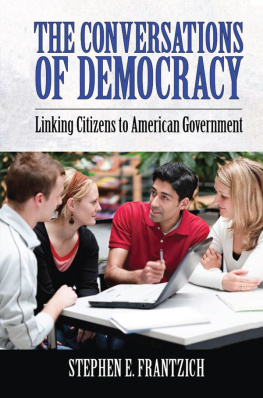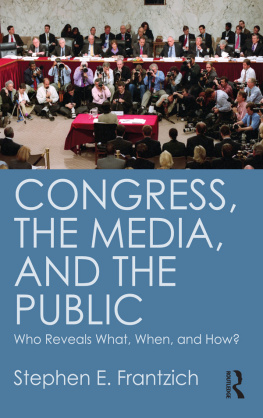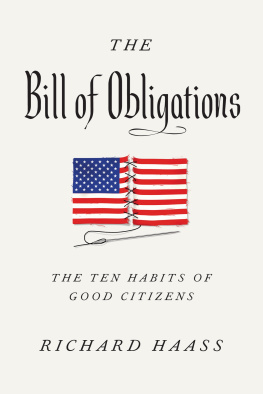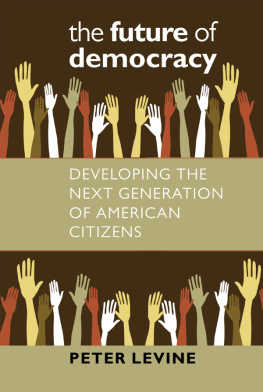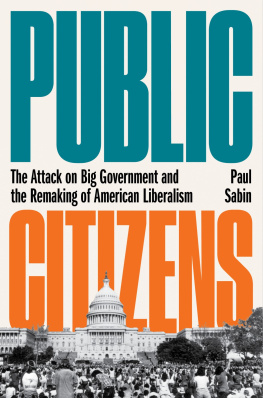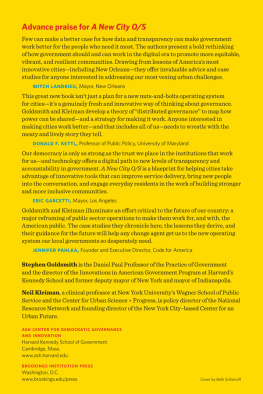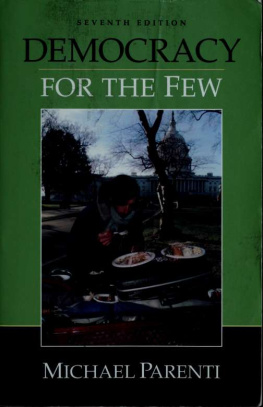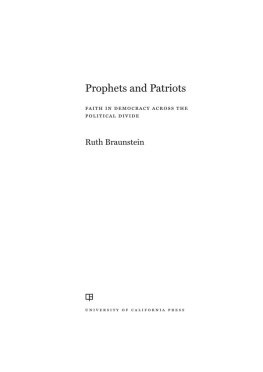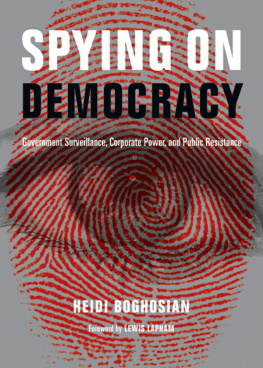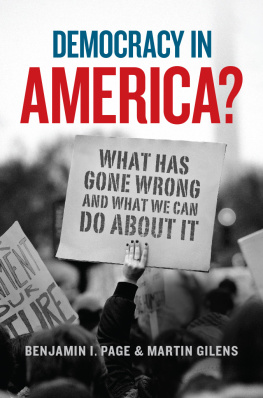First published 2011 by Paradigm Publishers
Published 2016 by Routledge
2 Park Square, Milton Park, Abingdon, Oxon OX14 4RN
711 Third Avenue, New York, NY 10017, USA
Routledge is an imprint of the Taylor & Francis Group, an informa business
Copyright 2011, Taylor & Francis
All rights reserved. No part of this book may be reprinted or reproduced or utilised in any form or by any electronic, mechanical, or other means, now known or hereafter invented, including photocopying and recording, or in any information storage or retrieval system, without permission in writing from the publishers.
Notice:
Product or corporate names may be trademarks or registered trademarks, and are used only for identification and explanation without intent to infringe.
Library of Congress Cataloging-in-Publication Data
Frantzich, Stephen E.
The conversations of democracy : linking citizens to American government / Stephen E. Frantzich.
p. cm.
Includes bibliographical references and index.
ISBN 978-1-59451-753-2 (hardcover : alk. paper) ISBN 978-1-59451-754-9 (pbk. : alk. paper)
1. Political participationUnited States. 2. ConversationPolitical aspectsUnited States. 3.
Communication in politicsUnited States. I. Title.
JK1764.F74 2010
320.973014dc22
2010014450
Designed and Typeset by Straight Creek Bookmakers.
ISBN 13: 978-1-59451-753-2 (hbk)
ISBN 13: 978-1-59451-754-9 (pbk)
Each persons life is lived in a series of conversations.
Deborah Tannen
In the most basic sense, politics is a set of conversations in which proponents of one position or candidate attempt to secure support from opponents and/or the undecided. Conversations flow from the public to policy-makers, between policy-makers, and from policy-makers to the public. Those engaged in initiating, framing, and carrying out these conversations have a significant effect on the policy and personnel of government. At best, the conversations lead to consensus; at worst, to deadlock, where participants do little more than to agree to disagree. Most often the result is a temporary compromise that generates further rounds of conversations.
The conversation model for politics is particularly useful because all of us engage in nonpolitical conversations and readily recognize the behaviors and strategies that either move or frustrate us. Just as importantly, this model allows us to build on the robust research and logic from sociology, psychology, and linguistics that, although seldom focusing on politics, offer useful insights into political conversations. Setting and participants make a difference, but the general character of conversations varies little. We can learn a lot about conversation among the general public by looking at what happens among leaders, and vice versa.
The conversational perspective naturally generates the image of the town square or general store cracker barrel, with everyone having a say in a rational dialogue.
Although this comforting image supports the ideals of direct democracy, it would be nave to see the contemporary political conversation in such terms. Not all conversations involve equal partners, nor are they based on logical deliberation. Some conversations are virtually dictated from the top. Emotion and illogical content often carry the day. Just because conversations fail our standards for the logical application of facts to a well-defined problem resulting in a reasonable set of actions, these shortcomings do not undermine their basic characteristics as conversations.
Envisioning politics as a conversation has deep roots in both political theory and practice. Theorists such as Jrgen Habermas and Hannah Arendt argue that in a democracy decisions should be reached through public dialogues in which participants draw equally from a common pool of information. Although not all policy decisions measure up to those criteria, some do and others approach it. Most observers believe that the existence of robust conversation is a worthy yardstick for evaluation of the democratic policy process.
WHAT MAKES A CONVERSATION?
The modern use of the word conversation has narrowed significantly to refer to oral interchanges between individuals. Originally, it implied a much closer relationship, stemming from the Latin conversationem, the act of living together. The word later took on the meaning of having dealings with others and even more intimately was used as a synonym for sexual intercourse, with criminal conversation serving as the legal term for adultery into the late eighteenth century.
Conversations have three basic characteristics. First, they involve reciprocal actions engaging two or more individuals in the process of explicitly and intentionally exchanging questions, answers, and comments. Ta l k implies unfocused verbal expressions with no particular goal. Monologue (a speech, lecture, or written position paper) might stimulate conversation, but it is not a conversation in and of itself. In Martin Bubers description, conversation requires that each of the participants really has in mind the other or others and turns to them with the intention of establishing a living mutual relationship between himself and them. Unlike an interview or interrogation, where a situational superior controls the episode and specific prompts and responses are expected, conversations involve more freewheeling interaction. If the ground rules are I ask the question and you give the answer, the interchange fails the test as a conversation.

Conversations are not one-way monologues lacking audience involvement. (Copyright 2008 Ares. All Rights Reserved. www.caglecartoons.com)
Second, in a conversation participants possess relatively equal rights to speak, ask questions, and respond, with the expectation of taking turns controlling the floor. Conversations involve social cooperation, operating together.
Third, conversations tend to be informal, unplanned, freewheeling, and open to changes in topic and inclusion of participants. The very fact that people are talking about something becomes an important factor in democratic politics. Topics lacking public attention through conversation tend to fall by the wayside.
Constraining the Analogy
A number of political analysts begin with conversations as a key element of democracy. Their definitions of useful conversations establish benchmarks for evaluation.
Rational choice theorists challenge the assumption that citizens are only marginally competent to choose between a restrictive set of candidates at election time and should leave governing largely to the elected. These theorists view citizens as having clear preferences that are ordered in priorities, that can be linked to policy choices through communications with officials, and that can be modified in relation to the political realities embodied in the competing preferences of others. In the rational choice model, citizens stand ready to engage themselves in the political process, hoping to win in the battle over preferences, but willing to abide by the outcome because accepting todays winner sets up the condition that their hope for a win in the future will be accepted by the losers at that time. Rational choice conceives of the world in terms of competitive teams forming and reforming to create majorities and minorities. Conversation become a means by which citizens identify allies, create acceptable compromises, plan strategy, celebrate wins, bolster each other after losses, and plan to stay in touch for the next round of battles.






